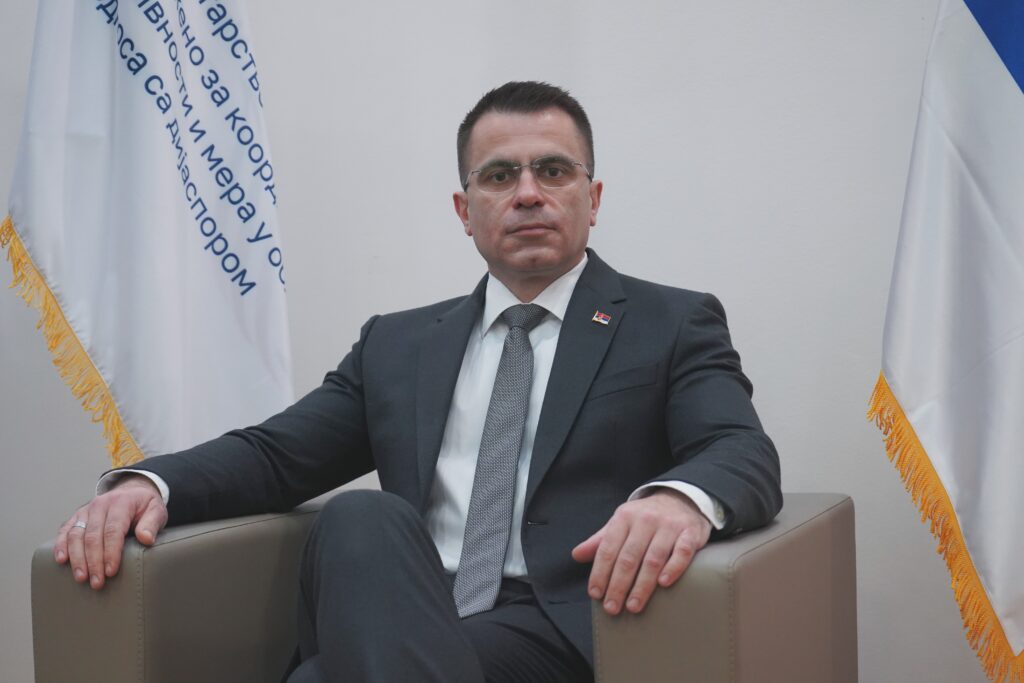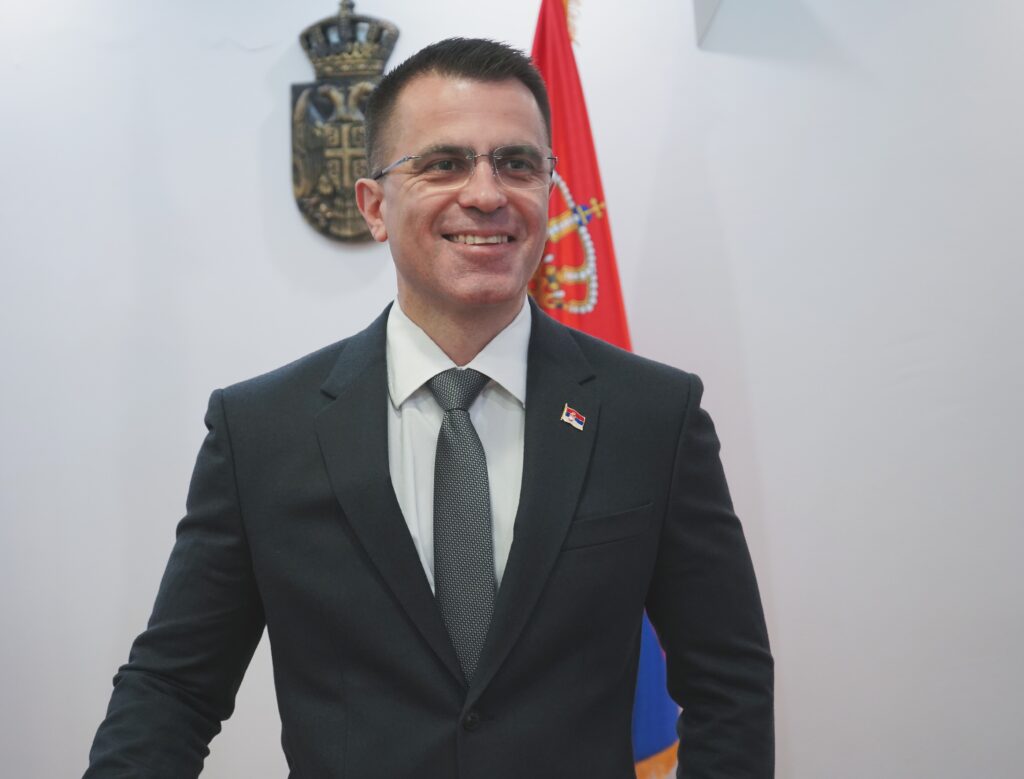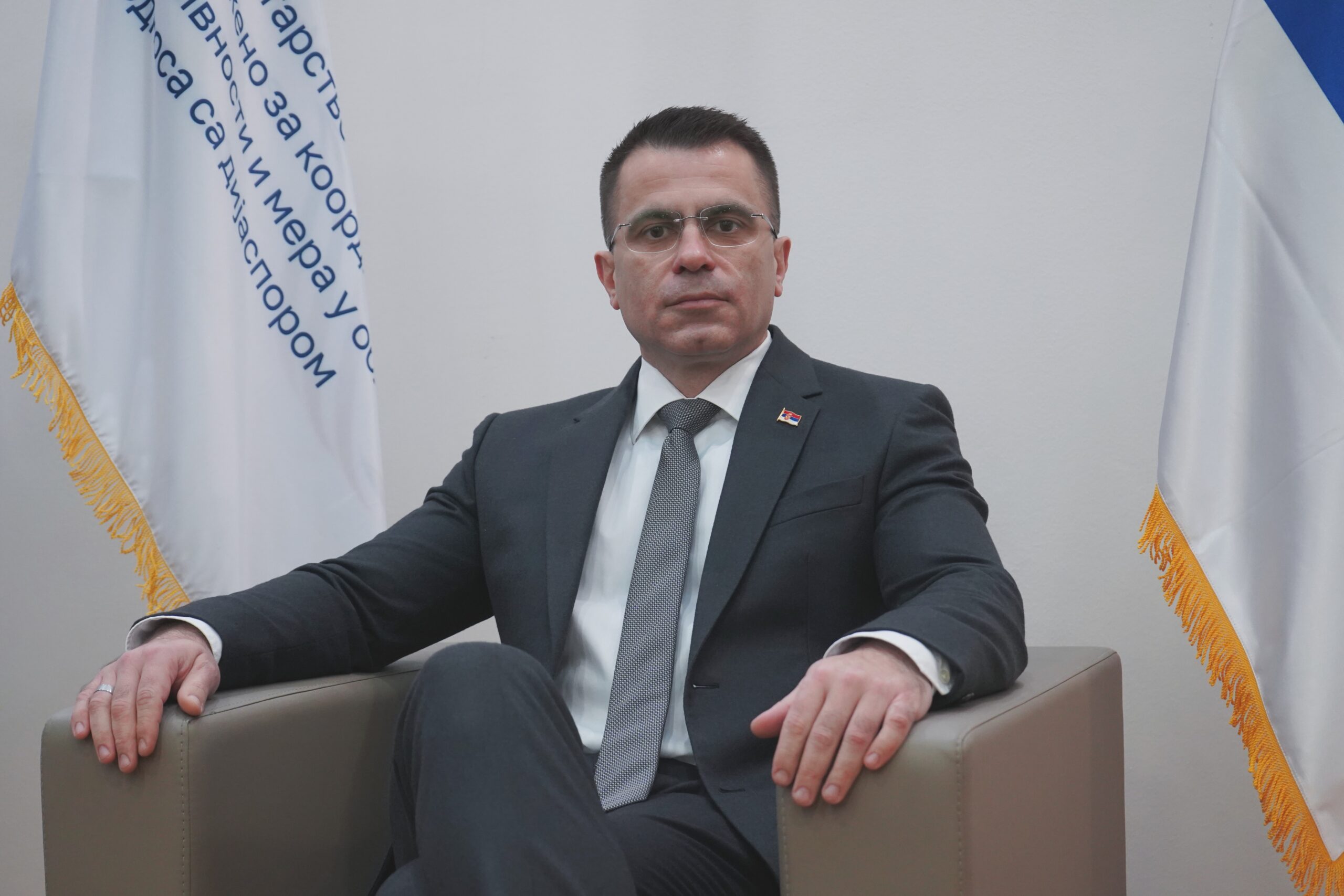Embracing Opportunities Across Borders
 By Dragan Nikolić
By Dragan Nikolić
Minister Đorđe Milićević shares insights on the role of the Serbian diaspora, their impact on the country’s future, and the efforts to strengthen connections across borders.
In recent decades, the “identity card” of the Serbian diaspora has changed. After the refugee wave of the 1990s, a new period of emigration from Serbia began, characterised by economic reasons and the departure of highly educated individuals. How do you assess this trend, and has it slowed down at least somewhat in recent years?
Migration has always been a part of human history. Still, in the past 20 years, with new technologies, globalisation, and job opportunities, migration has become much more intense than ever before. People now have more opportunities to live and build their careers beyond their home country’s borders, seeking new conditions and professional opportunities worldwide. This mobility is a natural part of modern civilisation, but it also poses a challenge for countries like Serbia, which are experiencing the departure of their citizens.
Faced with these global trends, we have recognised this issue as a priority and taken several steps to adapt to the new circumstances. It is important to understand that the task of every responsible state is not to prevent people from leaving but to create an environment where they feel connected to the world while remaining in their own country. People who go often seek better connections with international companies, advanced educational systems, global markets, and diverse cultures. We aim for Serbia to be a place where all these connections are present and easily accessible.
The example of the EXPO event and Serbia’s entire developmental cycle reflects precisely this approach. Bringing the world to Serbia and connecting Serbia with the world allows citizens to gain international experience while staying at home. Serbia is becoming increasingly integrated with global trends and opportunities by strengthening infrastructure, digitalisation, and creating a modern business environment.
There is increasing talk about people returning from the diaspora. What draws them back, and how does your department support this?
We must understand that when our people spend years, or even decades, abroad, their daily lives become deeply tied to the country where they live and work. Their professional, social, and family connections strengthen in those environments, deciding to return more challenging. This is precisely why our role is so significant – through various activities and events, we maintain ties with our diaspora, nurture unity, and inform them about Serbia’s dynamic changes and progress. We aim to ensure that Serbia remains a viable option in their lives and plans, whether for continuing their careers, living, or spending part of their time.
Our mission is to make the return to Serbia as natural and smooth as possible. Encouraging return is one of the priorities of the Government of the Republic of Serbia, and such an endeavour cannot be the responsibility of just one ministry—it is a collective task for all of us. That is why a range of government programmes is focused on engaging with associations and individuals in the diaspora, building bridges that connect people to their homeland.
It is imperative to highlight positive examples of successful individuals who have returned to Serbia. These people have achieved significant careers abroad and have decided to invest their knowledge, experience, and energy into Serbia’s development. Their stories inspire and prove that a successful future can be built in Serbia. The most important thing is maintaining constant contact with our diaspora – through information sharing, support, and involvement in development projects. This way, we build trust and strengthen the sense of belonging, creating a foundation for successful returns and shared progress.
Our diaspora is an immense human capital, a bridge to global opportunities
How significant is the diaspora for the Serbian economy and gross domestic product? Do you have data on the share of remittances in the GDP?
Our diaspora plays an exceptionally important role in Serbia’s development and economy. Remittances from abroad are estimated to contribute around 10% of the GDP, making them a significant source of income for our country. However, we must not view our diaspora solely through the lens of remittances. They represent a vast human capital connected to global markets, investors, and business networks. Our people in the diaspora are, in effect, economic ambassadors of Serbia. Many of them are successful entrepreneurs and investors in their respective communities. Their role in connecting Serbia with the world, creating new business opportunities, and attracting investments is invaluable. We must continue to develop this potential so that our diaspora becomes one of the key drivers of Serbia’s economic growth.
How does our country maintain contact with the diaspora and help emigrants preserve their national and cultural identity far from their homeland?
Serbia maintains strong ties with our people worldwide through embassies, consulates, cultural centres, and numerous associations. Our programmes aim to preserve the Serbian language, culture, and traditions among our diaspora. One of the key pillars of these efforts is organising Serbian language education, as it is vital for children born abroad to have the opportunity to learn their parent’s native language.
In the past two years, special attention has been given to organising camps in Serbia, where thousands of children from the diaspora and neighbouring countries have had the chance to visit their homeland. For many children, this was their first encounter with Serbia—an opportunity to taste traditional dishes, hear our songs, and learn more about our culture and history. These camps are invaluable for strengthening their sense of belonging and connection with their homeland.
The Office of the Minister for the Diaspora, as well as the entire Government of the Republic of Serbia, is responsible for continually listening to the needs of our compatriots. We strive to address these needs through new programmes and constantly connect with our people worldwide.
What is the significance of the Serbian Orthodox Church for the diaspora, and do you cooperate with the Church regarding the homeland’s relationship with the diaspora?
For nearly ten centuries, the Serbian Orthodox Church (SPC) has been a gathering place for the Serbian people. This was true during difficult times, and it remains so today. The Church is essential in preserving national identity and connecting our compatriots worldwide. The SPC nurtures the Serbian language, culture, traditions, and sense of belonging through church communities, parish activities, and religious institutions.
Because of this vital role, we work closely with the Serbian Orthodox Church, supporting and complementing each other through various programmes aimed at our diaspora. Our goal is to help our people and facilitate the preservation of their identity, wherever they may be, through joint initiatives.
 There is much speculation about the number of our emigrants. Some say Vienna is the largest “Serbian” city after Belgrade, referring to many of our people living there. What does the “top list” of such cities look like today? Where does Chicago rank, for example?
There is much speculation about the number of our emigrants. Some say Vienna is the largest “Serbian” city after Belgrade, referring to many of our people living there. What does the “top list” of such cities look like today? Where does Chicago rank, for example?
Vienna is undoubtedly one of the cities with the largest Serbian community, home to hundreds of thousands of our compatriots. On the other hand, Chicago has a long tradition of Serbian diaspora and boasts large communities of Serbs and people of Serbian origin. Besides Vienna and Chicago, significant Serbian communities can be found in cities such as Düsseldorf, Paris, Toronto, Sydney, and Moscow.
The history of migration has led to Serbs being present on every continent. Serbian communities exist everywhere in southern Africa, South America, New Zealand, Australia, Canada, and Russia. This represents immense human capital, a responsibility, and a tremendous opportunity for Serbia. Our task is to nurture and use this potential to strengthen ties with the world and contribute to our country’s development.
During Yugoslavia, our diaspora was part of a broader group of emigrants from all the republics of the former state. Do you have any information on the relationship between these communities in third countries today? Is there any form of cooperation or mutual support among them?
During Yugoslavia’s era, a Yugoslav diaspora brought together people from all the nations of the former state. However, even then, specific forms of organisation were based on the countries and nationalities that made up Yugoslavia. The Serbian diaspora nurtured its identity values, just as those who emigrated from Croatia, Bosnia, or other former republics did.
Today, our primary focus is on strengthening the connections among our compatriots, regardless of whether they emigrated from Serbia or other parts of the former Yugoslavia. It is important to us that all Serbs, wherever they may be, remain united and support one another through joint initiatives and programmes. We believe the prosperity of the entire region lies in fostering connections and resolving open issues. This can contribute to better understanding and cooperation between our people and diaspora members from other countries. However, our priority remains strengthening the connection between the Serbian diaspora and Serbia, as this bond is the foundation of our shared identity and future development.
Serbia must be a place where people realise their full potential and stay connected to the world
Do you believe that the migration balance could at least stabilise, if not reverse, in the coming period?
I do! I wouldn’t be doing this work if I didn’t believe it. I am confident that my colleagues in the Government of the Republic of Serbia share my optimism. Our priority is to improve life in Serbia, strengthen our connections with the world, and make Serbia a place where people stay and realise their full potential as individuals and as a nation. We believe that we can do a lot to encourage our people to return through dedicated work and showcasing Serbia’s progress. Our goal is for everyone living in Serbia today to find everything they seek elsewhere—to experience full recognition and success that will contribute to our shared progress. So, I repeat the message: we will have a successful Serbia if we remain united, no matter where we are.








